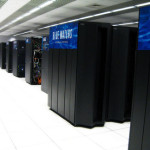Delta, a $10 million National Science Foundation-funded advanced computing system housed at the National Center for Supercomputing Applications at the University of Illinois, will soon be accessible to researchers across the country via XSEDE allocation. Using a design that leverages graphics processing units (GPUs) in combination with CPU architectures well-suited for scientific computing, Delta will be particularly suited to […]
Applications Open for New Frontiers Initiative Graduate Research Fellowships
Grad students wanting to focus on their research have a new opportunity to do just that. The New Frontiers Initiative Graduate Fellowships provide PhD students with a year of full-time research support, including a $38,000 stipend, up to $12,000 in tuition allowance, and an allocation up to 100,000 node-hours on the powerful Blue Waters petascale […]
NCSA’s Bill Gropp Voted IEEE CS 2022 President
Oct. 14, 2020 — The National Center for Supercomputing Application’s (NCSA) Director and Chief Scientist William “Bill” Gropp has been voted IEEE Computer Society 2021 president-elect and will serve as president in 2022. The president oversees IEEE CS programs and operations and is a nonvoting member of most IEEE CS program boards and committees. The IEEE CS is the […]
NCSA’S Donna J. Cox Wins IPS Technology Innovation Award
Donna J. Cox, director of NCSA’s Advanced Visualization Laboratory (AVL), was recently awarded the International Planetarium Society’s 2020 Technology Innovation Award. This is just the eighth time since the society’s founding in 1958 that this honor has been bestowed. It is only awarded when a recipient is identified as meeting the award criteria: an individual with “a broad, deep […]
The Hyperion-insideHPC Interviews: Supercomputing Populist Merle Giles on the Business Realities of Commercial HPC
This interview is with Merle Giles, founder and CEO of Moonshot Research and a tireless advocate for HPC’s role as an accelerator to industrial innovation. While he was at the National Center for Supercomputing Applications (NCSA) at the University of Illinois at Urbana-Champaign, his team partnered with nearly 60 percent of the manufacturers in the U.S. FORTUNE100®, as well as with bio-medical, chemical, tech, oil and gas, and agriculture companies. He and his corporate partners were founding members of two key digital manufacturing consortia….
NCSA’s Upcoming $10M Delta System to Expand Use of GPUs in Scientific Workloads
Delta, a new supercomputer to be deployed before the end of 2021 at the National Center for Supercomputing Application’s (NCSA), has as part of its mission the expanded adoption of GPU-accelerated scientific computing. NCSA Director Bill Gropp told us that that while NCSA is not new to GPUs (some years ago, staffers there configured a […]
TACC’s Frontera Supports Investigation of Subatomic Protons – ‘the Origin of the Mass of Objects’
A team of researchers are using the Frontera supercomputer at the Texas Advanced Computing Center (TACC) to crack open the proton, a fundamental building block of the atomic nucleus that is used, among other ways, as a medical probe in magnetic resonance imaging. Frontera, the world’s fifth-ranked HPC system on the Top500 list and the […]
NCSA Joins Nationwide Collaboration to Combat COVID-19
NCSA is joining C3.ai, Microsoft Corporation, and research institutions across the country as part of the new C3.ai Digital Transformation Institute (C3.ai DTI). This new institute, a multi-disciplinary effort focused on artificial intelligence and advanced computing, will initially accept proposals related to the abatement of COVID-19, and mitigating risks from future pandemics using AI. “This new institute will greatly expand the use of computing and data to improve the world, starting with bringing together a consortium of leading institutions to address the COVID-19 crisis.”
Video: Research on Blue Waters
Dr. Brett Bode from NCSA gave this talk at the HPC User Forum. “Blue Waters is one of the most powerful supercomputers in the world and is one of the fastest supercomputers on a university campus. Scientists and engineers across the country use the computing and data power of Blue Waters to tackle a wide range of challenging problems, from predicting the behavior of complex biological systems to simulating the evolution of the cosmos.”
Supercomputing Earth’s Geomagnetism with Blue Waters
Researchers are using the Blue Waters supercomputer at NCSA to better understand geomagnetic variations and their underlying mechanisms, so that better forecasting models can be developed. “Without Blue Waters (or any comparable computing facilities), we would have to scale back our ensemble size in order to complete all simulations within a reasonable time frame. This will certainly limit our ability to achieve meaningful research and application goals.”









